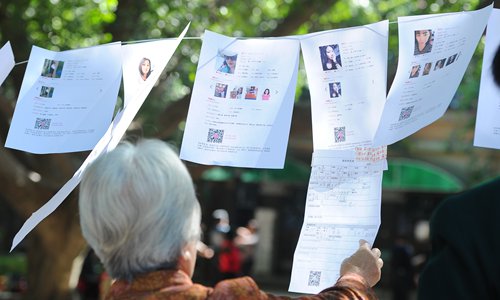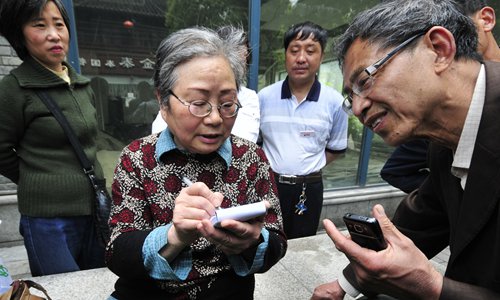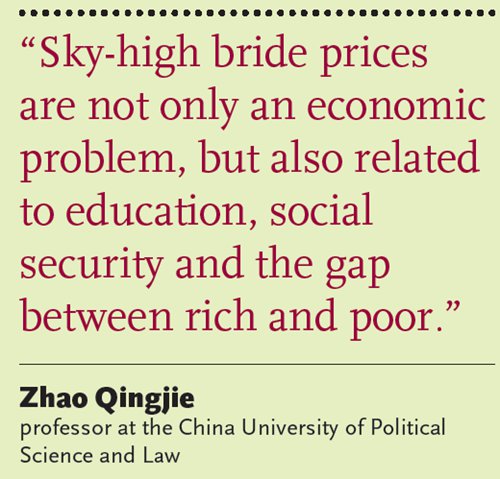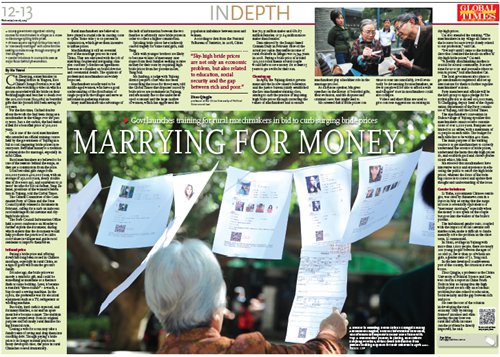HOME >> CHINA
Govt launches training for rural matchmakers in bid to curb surging bride prices
By Hu Yuwei Source:Global Times Published: 2019/6/25 19:11:11
○ County government organized training courses for matchmakers in villages as a move to discourage spiking bride prices
○ Chinese experts say high bride prices result in "mercenary marriages" with some families seeking to make money through marrying off their daughters
○ Gender imbalance in countryside seen as major factor behind phenomenon.

Cai Zhenying, a matchmaker in Yujiang district in Yingtan, East China's Jiangxi Province, was left shaken after watching a video in which a groom quarreled with his bride on their wedding night and beat her to death over the 200,000 yuan ($29,082) in betrothal gifts that his parents had been saving for 10 years.
For the first time, Cai had doubts about the work she had been doing as a matchmaker in the village over the past 15 years. Just a day earlier, she had sealed a deal for a betrothal price of 300,000 yuan.
Cai is one of the rural matchmakers who attended an official training course held by the government of Yujiang in a bid to cool staggering bride prices in recent years. Betrothal money is a traditional prerequisite for marriage, especially in rural China.
Rural matchmakers are believed to be one of the reasons behind the surge, as they get a commission from the price.
Local betrothal gifts range from 100,000 yuan to 400,000 yuan, with an average of 250,000 yuan, nearly double that of five years ago, and equivalent to 21 years' income for a local farmer, Yang Zanmei, president of the women's federation in Yujiang, told the Global Times.
The Central Committee of the Communist Party of China and the State Council jointly released a document in February, calling for a curb on indecent rural marriage social customs and sky-high bride prices.
The State Council Information Office held a press conference on Monday to further explain the document, during which experts that the document would help promote the practice of socialist core values in villages and guide rural residents to improve themselves.

Inflated price
Paying a bride price and offering dowry has long been rooted in Chinese marriage, especially in rural China, as a sign of good will from the groom's family.
Decades ago, the bride price was merely a symbolic gift, and could be something as mundane as a thermos flask or some bedding. Later, it became a standard "three rounds" - a watch, a bicycle and a sewing machine. In the 1980s, the preference was for electrical equipment such as a TV, refrigerator or washing machine.
But today, hard cash is expected, and for many families, a car and an apartment have become a must. The tradition has now strayed away from its original purpose and left many rural families facing financial ruin.
Getting a wife for a son may take a family years of saving and drag them into crushing debt. Though paying a bride price is no longer normal practice in many developed cities, the price in rural China has soared dramatically.
Rural matchmakers are believed to have played a crucial role in causing costs to spike. Some take 5 to 10 percent in commission, which gives them incentive to inflate prices.
Matchmaking is still an essential part of the marriage process in rural China. They are entrusted with the job of matching couples and navigating complex customs to finalize an agreement between two families on bridal dowries and ceremonial details. The opinions of professional matchmakers are widely respected.
Matchmakers usually tend to be middle-aged women, who have a good understanding of the distribution of single people in the villages and serve as information-gathering stations.
Many matchmakers take advantage of the lack of information between the two families to arbitrarily raise bride prices in order to collect a higher commission.
Spiraling bride prices have indirectly caused tragedy for some rural girls, said Yang.
Girls with younger brothers are likely to become victims of mercenary marriages from their families seeking to raise money for their sons by requiring high bride prices from her parents-in-law, Yang said.
Ma Junfeng, a judge with Yujiang district people's court who has been researching the issue for three years, told the Global Times that disputes caused by bride prices are prominent in Yujiang, and are mainly due to the underdeveloped economy and the large outflow of women, which has aggravated the population imbalance between men and women.
According to data from the National YuBureau of Statistics, in 2018, China has 713.51 million males and 681.87 million females, or 31.64 million more males than females.
Data released by the Jiangxi-based Gannan Daily in February showed the actual per capita disposable income of rural residents in Jiangxi was 11,744 yuan in 2018. Paying a bride price of around 300,000 yuan means a rural couple would have to save money for at least 15 years to get a wife for their son.

Cleaning up
In April, the Yujiang district government and the local women's federation and the justice bureau jointly established the first matchmaker training class, aiming to curb the practice of imposing high bride prices through correcting the values of matchmakers and to ensure matchmakers play a healthier role in the marriage process.
As a keynote speaker, Ma gives speeches on the history of betrothal gifts, their evolution, and the disputes and criminal cases they might lead to.
Ma stressed that if bride prices continue to soar uncontrollably, it will eventually be devastating for matchmakers, as fewer people will be able to afford a wife and villagers' trust in matchmakers could also collapse.
Videos and short films are used to give concrete suggestions on reining in sky-high prices.
Cai also attended the training. "The matchmakers in my village all came to the lectures because it was closely related to our profession," said Cai.
"It wasn't until I came to the training class that I realized the knock-on effect of sky-high bride prices," Cai said.
"A healthy matchmaking market is crucial for a rural community. It is now time for us to try and persuade others to rein in prices," said matchmaker Cai.
The local government also plans to get matchmakers registered and set up associations for them to further regulate matchmakers' actions.
Party members and officials will be the first group to sign a pledge for betrothal gifts not to exceed 100,000 yuan, Yi Changqing, deputy head of the organization department of the Party committee of Yujiang, told the Global Times.
The matchmaker's convention in Dukou village of Yujiang specifies that matchmakers cannot receive commissions of over 2,000 yuan. Banquets are limited to 20 tables, with a maximum of 12 people on each table. The budget for each table has to be within 400 yuan.
The main purpose of the training course is to get matchmakers to correctly understand the essence of bride prices, understand the harm that sky-high prices do, and establish good and correct professional ethics, Ma said.
Ma stressed that matchmakers have innovative tactics and experience in educating the public to resist sky-high bride prices, whereas the focus of the training course is to correct and update their thought and understanding of the issue.
Gender imbalance
Li Yinhe, a prominent Chinese sexologist, was cited by chinanews.com in a report in May as saying that the surge in costs is essentially equivalent to a "mercenary marriage," especially when the money is not spent on the couple but goes into the wallets of the bride's parents.
The imbalanced gender ratio, coupled with the impact of social customs and market rules, make it difficult to fundamentally solve the problem in the short term, Li commented.
In Shaxi, a village in Yujiang with more than 1,600 people, there are nearly 200 young people between the ages of 20 and 30, fewer than 50 of whom are girls, a gender ratio of 3:1, Yang said.
In the less developed southwestern part of the country, the situation is even worse.
Zhao Qingjie, a professor at the China University of Political Science and Law, was cited in a report in China Youth Daily in May as saying that sky-high bride prices are not only an economic problem,but also related to education, social security and the gap between rich and poor.
He sees the root of the solution in developing the rural economy. Only by raising farmers' incomes and eliminating the gap between rural and urban incomes can the problem be directly improved, he said.

Newspaper headline: Marrying for money
○ Chinese experts say high bride prices result in "mercenary marriages" with some families seeking to make money through marrying off their daughters
○ Gender imbalance in countryside seen as major factor behind phenomenon.

A mother in Nanning, South China's Guangxi Zhuang Autonomous Region, browses information on women, one of whom she hopes will be her son's future wife. Photo: CFP
Cai Zhenying, a matchmaker in Yujiang district in Yingtan, East China's Jiangxi Province, was left shaken after watching a video in which a groom quarreled with his bride on their wedding night and beat her to death over the 200,000 yuan ($29,082) in betrothal gifts that his parents had been saving for 10 years.
For the first time, Cai had doubts about the work she had been doing as a matchmaker in the village over the past 15 years. Just a day earlier, she had sealed a deal for a betrothal price of 300,000 yuan.
Cai is one of the rural matchmakers who attended an official training course held by the government of Yujiang in a bid to cool staggering bride prices in recent years. Betrothal money is a traditional prerequisite for marriage, especially in rural China.
Rural matchmakers are believed to be one of the reasons behind the surge, as they get a commission from the price.
Local betrothal gifts range from 100,000 yuan to 400,000 yuan, with an average of 250,000 yuan, nearly double that of five years ago, and equivalent to 21 years' income for a local farmer, Yang Zanmei, president of the women's federation in Yujiang, told the Global Times.
The Central Committee of the Communist Party of China and the State Council jointly released a document in February, calling for a curb on indecent rural marriage social customs and sky-high bride prices.
The State Council Information Office held a press conference on Monday to further explain the document, during which experts that the document would help promote the practice of socialist core values in villages and guide rural residents to improve themselves.

A matchmaker (center) in Jiaxing, East China's Zhejiang Province, writes down information from parents seeking a spouse for their children in April 2011. Photo: CFP
Inflated price
Paying a bride price and offering dowry has long been rooted in Chinese marriage, especially in rural China, as a sign of good will from the groom's family.
Decades ago, the bride price was merely a symbolic gift, and could be something as mundane as a thermos flask or some bedding. Later, it became a standard "three rounds" - a watch, a bicycle and a sewing machine. In the 1980s, the preference was for electrical equipment such as a TV, refrigerator or washing machine.
But today, hard cash is expected, and for many families, a car and an apartment have become a must. The tradition has now strayed away from its original purpose and left many rural families facing financial ruin.
Getting a wife for a son may take a family years of saving and drag them into crushing debt. Though paying a bride price is no longer normal practice in many developed cities, the price in rural China has soared dramatically.
Rural matchmakers are believed to have played a crucial role in causing costs to spike. Some take 5 to 10 percent in commission, which gives them incentive to inflate prices.
Matchmaking is still an essential part of the marriage process in rural China. They are entrusted with the job of matching couples and navigating complex customs to finalize an agreement between two families on bridal dowries and ceremonial details. The opinions of professional matchmakers are widely respected.
Matchmakers usually tend to be middle-aged women, who have a good understanding of the distribution of single people in the villages and serve as information-gathering stations.
Many matchmakers take advantage of the lack of information between the two families to arbitrarily raise bride prices in order to collect a higher commission.
Spiraling bride prices have indirectly caused tragedy for some rural girls, said Yang.
Girls with younger brothers are likely to become victims of mercenary marriages from their families seeking to raise money for their sons by requiring high bride prices from her parents-in-law, Yang said.
Ma Junfeng, a judge with Yujiang district people's court who has been researching the issue for three years, told the Global Times that disputes caused by bride prices are prominent in Yujiang, and are mainly due to the underdeveloped economy and the large outflow of women, which has aggravated the population imbalance between men and women.
According to data from the National YuBureau of Statistics, in 2018, China has 713.51 million males and 681.87 million females, or 31.64 million more males than females.
Data released by the Jiangxi-based Gannan Daily in February showed the actual per capita disposable income of rural residents in Jiangxi was 11,744 yuan in 2018. Paying a bride price of around 300,000 yuan means a rural couple would have to save money for at least 15 years to get a wife for their son.

Cleaning up
In April, the Yujiang district government and the local women's federation and the justice bureau jointly established the first matchmaker training class, aiming to curb the practice of imposing high bride prices through correcting the values of matchmakers and to ensure matchmakers play a healthier role in the marriage process.
As a keynote speaker, Ma gives speeches on the history of betrothal gifts, their evolution, and the disputes and criminal cases they might lead to.
Ma stressed that if bride prices continue to soar uncontrollably, it will eventually be devastating for matchmakers, as fewer people will be able to afford a wife and villagers' trust in matchmakers could also collapse.
Videos and short films are used to give concrete suggestions on reining in sky-high prices.
Cai also attended the training. "The matchmakers in my village all came to the lectures because it was closely related to our profession," said Cai.
"It wasn't until I came to the training class that I realized the knock-on effect of sky-high bride prices," Cai said.
"A healthy matchmaking market is crucial for a rural community. It is now time for us to try and persuade others to rein in prices," said matchmaker Cai.
The local government also plans to get matchmakers registered and set up associations for them to further regulate matchmakers' actions.
Party members and officials will be the first group to sign a pledge for betrothal gifts not to exceed 100,000 yuan, Yi Changqing, deputy head of the organization department of the Party committee of Yujiang, told the Global Times.
The matchmaker's convention in Dukou village of Yujiang specifies that matchmakers cannot receive commissions of over 2,000 yuan. Banquets are limited to 20 tables, with a maximum of 12 people on each table. The budget for each table has to be within 400 yuan.
The main purpose of the training course is to get matchmakers to correctly understand the essence of bride prices, understand the harm that sky-high prices do, and establish good and correct professional ethics, Ma said.
Ma stressed that matchmakers have innovative tactics and experience in educating the public to resist sky-high bride prices, whereas the focus of the training course is to correct and update their thought and understanding of the issue.
Gender imbalance
Li Yinhe, a prominent Chinese sexologist, was cited by chinanews.com in a report in May as saying that the surge in costs is essentially equivalent to a "mercenary marriage," especially when the money is not spent on the couple but goes into the wallets of the bride's parents.
The imbalanced gender ratio, coupled with the impact of social customs and market rules, make it difficult to fundamentally solve the problem in the short term, Li commented.
In Shaxi, a village in Yujiang with more than 1,600 people, there are nearly 200 young people between the ages of 20 and 30, fewer than 50 of whom are girls, a gender ratio of 3:1, Yang said.
In the less developed southwestern part of the country, the situation is even worse.
Zhao Qingjie, a professor at the China University of Political Science and Law, was cited in a report in China Youth Daily in May as saying that sky-high bride prices are not only an economic problem,but also related to education, social security and the gap between rich and poor.
He sees the root of the solution in developing the rural economy. Only by raising farmers' incomes and eliminating the gap between rural and urban incomes can the problem be directly improved, he said.

Newspaper headline: Marrying for money
Posted in: IN-DEPTH